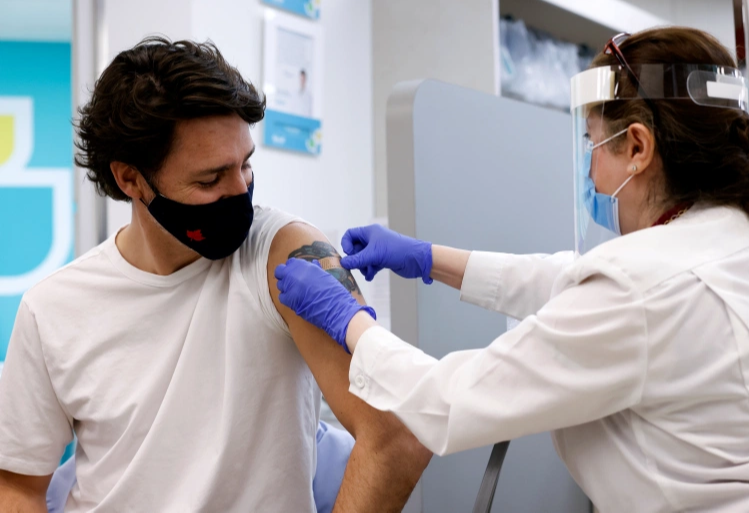
Canada's Prime Minister Justin Trudeau gets an adhesive strip after being inoculated with AstraZeneca's vaccine against coronvirus at a pharmacy in Ottawa. (Photo: Blair Gable/Reuters)
Ottawa, April 24 (RHC)-- New daily cases of COVID-19 in Canada could almost double to more than 15,000 from 8,600 by the end of April unless stricter measures are taken as new coronavirus variants spread, health officials warned in Ottawa. The officials told a briefing that if people cut the number of personal contacts by 20-30 percent, the number of cases could drop to about 4,500.
“Elevated case counts and severe illness trends remind us we are still in a right race between vaccines and variants and our actions matter,” said Chief Public Health Officer Theresa Tam. Prime Minister Justin Trudeau echoed the call to reduce personal contact, saying the “COVID-19 situation is critical.”
Major provinces such as Ontario are struggling to cope with a worsening third wave of COVID-19 and accuse Ottawa of not doing enough to clamp down on the spread of new, more highly transmissible virus variants and also of bungling the procurement of vaccines. Ontario reported more than 4,500 new cases on Friday.
Vaccine shortages have prompted Canada to delay second doses of vaccines by up to four months.
Trudeau and his wife Sophie received their first doses of the AstraZeneca vaccine on Friday. The Canadian prime minister said that his country had signed a deal with COVID vaccine producer Pfizer for 35 million booster doses for 2022 and 30 million in 2023, with options to add an additional 30 million doses in 2022 and 2023 and 60 million doses in 2024. He said the government is talking with other vaccine manufacturers about their plans for booster shots, too.
The vaccines are so new that experts do not yet have firm data on how long their protection will last, or if they will be affected by emerging variants of the virus. “Canadians expect us to be ready for whatever happens. There is certainly a hope that booster shots might not be necessary, but we are much better to ensure that we are prepared in case they are,” Trudeau said at a news conference in Ottawa.
The prime minister says 30 percent of eligible adults in Canada have received at least one vaccine. All eligible Canadians are expected to be able to get at least one dose by the end of June.
The Pacific Coast province of British Columbia restricted non-essential travel between three regional health districts to try to curb the spread of COVID-19. Solicitor General Mike Farnworth, who is also the minister of public safety, said the order forbids recreational travel between the districts, but allows trips for essential reasons such as school, work, healthcare or commercial transportation.
Canada has so far recorded a total of 23,835 deaths and 1,167,684 cases of COVID-19, according to a tally by Johns Hopkins University.

